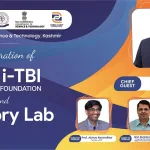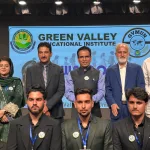A brisk walk along history can make one realize why the words “Agar firdaus bar roo-e-zameen ast” (If there is a paradise on earth, it is this, it is this, it is this) are inscribed in the Diwaan-e-Khaas of the Red Fort. Has Amir Khusroo’s paradise changed? What’s something you used to believe that you have since changed your mind about? It’s an interesting question to ponder, forcing us to come face to face with the ways in which we, our beliefs and values in our paradise have changed over time.
Major financial scam surfaces in Kashmir, investors allegedly duped of crores by private firms. An unnatural lust of power and wealth overnight has sunk our values, with the advancement in space of technology, cases of financial frauds, duping’s are on the rise. The vale of Kashmir known for its rich cultural heritage with practices and social norms often prioritize the well-being of others, the close-knit community may foster a sense of interconnectedness and mutual support. The qualities such as generosity, modesty, caring nature, hospitality, and a readiness to help others, are often attributed to cultural values and traditions that have been ingrained in Kashmiri society contributed to the development of a distinct cultural identity.
The challenging environment, including harsh winters and difficult terrain, may encourage a spirit of cooperation and mutual assistance among the community members. Traditional social structures and community ties in Kashmir often emphasize collective well-being. This may lead to a culture of caring for one another and offering support in times of need. The region has a history marked by both cultural diversity and conflict. The resilience of the people in the face of challenges may contribute to a sense of solidarity and compassion. These values are often integrated into daily life and interactions. It’s important to note that while these qualities are often celebrated, individual experiences and perspectives within any community, societal changes, geopolitical factors, and economic shifts can influence cultural dynamics over time. For the land we live in, many of us have a problem with people around with treacherous intentions on trust. These days in Kashmir people might find it challenging to trust others, a question that perhaps most of us never considered is closely linked to, where and when to strike a balance between trust and caution?
Frequent experiences of being cheated, exploited, or getting betrayed by someone close can lead to a general lack of trust in others ultimately trickled down to society at large. Such experiences can make it difficult to believe in the sincerity of others. In the age of unregulated social media, people often present curated versions of their lives, showcasing only the positive aspects through image management. Detecting covert lifestyle and behaviors is a big challenge, finding a suitable match for marriage has indeed become difficult when the true character of individuals is obscured. In today’s digital age, where much of our interactions happen online, it can be difficult to assess someone’s true nature and values. This can create a sense of skepticism as individuals may question the authenticity of the personas people project online versus their real selves.
What’s something you used to believe that you have since changed your mind about? Sadly, there have been many developments and cultural shifts in societal norms, values, traditions, and cultural dynamics which ultimately had impacted our moral compass. Behavioral changes, such as increased individualism and competitiveness, where personal interests are prioritized over collective well-being, has eroded moral values as people are more focused on self-advancement contributed towards an environment where people may be less willing to trust others. When there is a perceived lack of consequences for unethical behavior, individuals and institutions may be more prone to engage in morally questionable actions. Moral decline and a focus on material wealth may erode cultural values and traditions, impacting the identity and cohesion of a community.
The society trading on traditional culture and the moral values get redefined or diluted, are factors that contribute to moral erosion. This cannot be Amir Khusroo’s paradise or my Kashmir. I was brought up, or that of, if we start believing the media and look at a wider spectrum of disturbing stories, we are living in a society with moral decline, corruption, trust deficit, and a relentless race to become rich. Living in a rapidly changing world, uncertainties can be challenging, as it involves navigating through inconsistent behavior’s and managing potential trust issues. At times the situation is so murky you are indecisive in decisions how others will behave. This uncertainty of background check,” who is who” may contribute to a general wariness and a reluctance to trust easily. In the digital age, there is a constant influx of information, making it difficult to discern what is authentic or misinformation, and fake news can contribute to a general sense of skepticism and distrust. The relentless pursuit of wealth erodes cultural values and traditions, impacting the identity and cohesion of a community.
Can We Avoid Taking Risk? We are not angels or fortune tellers to predict future behaviors to drive carefully on this road called ‘life’, because people switch lanes on you without a signal. Satan, their master, can disguise him/herself as an angel of light. The act of regularly praying or engaging in religious practices and donning certain types of attire can be meaningful in some cases. However, it’s also true that some people may misuse attire and outward displays of religious practices for reasons other than genuine belief, such as societal expectations, peer pressure, or even deception. Additionally, there are instances where people have used religious symbols or practices to project a certain image, gain social approval, or manipulate perceptions. Often you are pushed to situations where you have to take a risk as a guideline, the most honorable is the one who fears Allah provided in the Quran to have checks and balances on integrity in such situations is much rewarding.
Constant exposure to corruption and moral decline may lead to a pervasive sense of cynicism and apathy, where individuals feel powerless to effect positive change. Despite these challenges, it’s important to note that individuals and communities can still work towards positive change. Initiatives promoting ethical behavior, transparency, education, and social responsibility can help address some of these issues.
Building a collective awareness and commitment to shared values can contribute to the restoration of trust and the cultivation of a more just and compassionate society. Trusting people around you can vary from person to person and the circumstance you are in. It is important to approach the situation with a cautious approach but what can be an intriguing question to ponder, why in Kashmir people might find it challenging to trust others? To gauge how much is “too much,” you may want to consider many factors. While unraveling the erosion of moral values and trust in utopian settings, remember that changing societal dynamics can be a slow process, and maintaining your commitment to truth and integrity often requires patience and perseverance. The last words but not lost words still hold relevance today; “Focus on Goals, Winning the War-You Might Lose Few Battles in The Process “before you may fall into slumber.
(Author besides being a medical doctor is very active in positive perception management of various moral, social and the issues. He can be reached at [email protected] & twitter)





